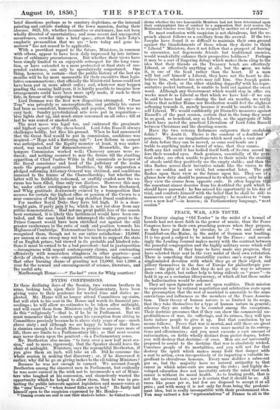DYING CONFESSIONS.
Irr these declining days of the Session, two veteran brothers in arms, looking back upon their. lives Parliamentary, have been giving voice to their penitence for wasted time and duties ne- glected. Mr. Hume will no longer attend Committees up-stairs, but will stick to his seat in the House and watch its financial pro- ceedings; he will allow no estimates to be taken after midnight, and will exact them from Ministers early in the session. He will clo this "religiously "—that is, if he be in Parliament. But we must remember that he counts upon his exemption from sitting in Committees, precisely because he is above sixty years of age—much above sixty ; and although we are happy to believe that there is stamina enough in Joseph Hume to promise many years more of life, there are limits to a Parliamentary life ; so that next session may never dawn upon the penitent--in a Parliamentary sense. Mr. Brotherton also means "to turn over a new leaf next ses- sion," and to move, rierously, that the Speaker should leave the chair at midnight. Ministers, says the reproachful Brotherton, if you give them an inch, will take an ell. Did he consume the whole session in making that discovery ; or, if he discovered it earlier, why did' he go on giving inches to the ell-taking Ministers? Because he was not enough in earnest. We account Joseph Brotherton among the sincerest men in Parliament, but evidently he was more earnest in the wish not to incommode a set of Minis- ters who laughed at his concession, and shamelessly wasted the opportunity which he helped to allow them, than he was in pro- tecting the public interests against legislation and money-votes at the " sma' hours," "when honest folks are in bed." He fairly laid himself open to the suspicion expressed by Mr. Henley- " Coming events are said to cast their shadows before : he wished he could
divine whether the two honourable Members had not been determined upon their contemplated line of conduct by a supposition that neat session the Ministerial benches were likely to be occupied by another set of gentlemen."
To meet confession with suspicion is not chivalrous, but the re- proach almost follows as a corollary from the avowal. If the two Josephs have found it so difficult to maintain their own ground against the blandishments of those whom they desire to think " Liberal " Ministers, does it not follow that a prospect of having to encounter, not degenerate friends but traditional enemies, would wonderfully enhance their prospective boldness ? Perhaps it may be a sort of lingering dotage which makes them cling to the idea that their friends on the Treasury nch are effectively Liberal, or effectively anything at all; but the ror, we take it, is one of the head rather than the heart. If a man
will but call himself a Liberal, they have not the heart to dis-
believe him, whatever his acts may ecd1 him. One Joseph point- ing to the clock, or the other standing doggedly' with his repre- sentative pocket buttoned, is unable to hold out against the sweet
word. Although any Government which would stop in office six weeks must be as Liberal as that which we have had—if we can
be said to have had any—during the last six months we verily believe that neither Hume nor Brotherton would feel the slightest softening towards it, merely because it would be unable to call it-
self Liberal. We would confidently pit Disraeli's measures against Russell's of the past session, certain that in the lump they must be as good, as beneficial, nay as Liberal, as the aggregate of bills which have meted the practical Liberalism of Lord John Russell between Christmas and the shooting-season. Have the two veteran Reformers outgrown their credulous foible ? We doubt it. Theirs is the candour of a deathbed r pentance. There are imaginations which need such a vast tor' of data before they can be moved, as some cool heads are treble to anything under a barrel of wine, that they minter,
forth any fact until it has bodied itself forth of its own accord be- fore their rounded eyes. Such geniuses, essentially of the prac- tical order, are often unable to picture to their minds the stealing of steeds until they positively see the empty stable ; and then the idea flashes across their inventive minds like the vision to the poet—as sudden and as vivid, but somewhat later. The past flashes upon their view as the future upon his. They see at a glance how duty should be pursued in its whole course, only he and they view the course from opposite ends. It often happens that the repentant sinner descries from his deathbed the path which he should have pursued : he has missed his opportunity in his day of
trial, and comforts himself with the belief that he shall be able to manucevre out of Fate another opportunity : he resolves to "turn over a new leaf"—in heaven ; in Parliamentary language, "next session."


























 Previous page
Previous page